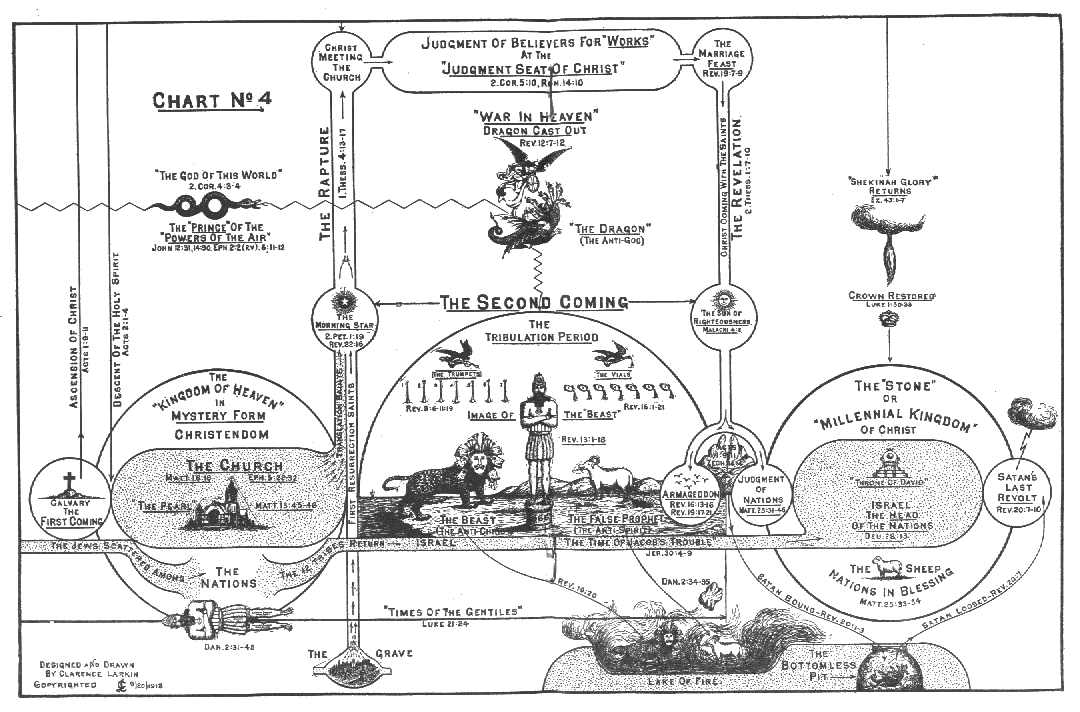First of all–please know that there is no reason to downplay the seriousness of this outbreak. The World Health Organization does not use the term “pandemic” lightly. Already, as I write this, there are 155,423 cases world wide, and 5,802 people have died–including, to bring this closer to home, 37 in the US. By the time you read this, those numbers will only have climbed. The decision of my school, Pittsburgh Theological Seminary, to cancel events at least through May and in-person classes for the remainder of the term, was a measured and responsible decision. However, there is no need for panic or despair. We need to keep praying, to keep trusting in the Lord, and to keep on ministering to one another–particularly to those most threatened.
One of my students asked that I consider a question in this blog:
Specifically, is this the end of days? I have heard a number of students joke and comment about this, and I think the jokes and comments about the apocalypse do indicate a small underlying fear. Between the wildfires in Australia, the tornados in the south, the locusts in Eastern Africa currently, and now this virus … I can definitely see where they are coming from!
After I received that email, I saw that this question was being considered by many on line. Some sources reply to this question cautiously. Dr. Michael Brown, with the Evangelical Christian Post, writes:
My own understanding is that there will be massive upheaval before the end of the world, in the midst of which there will also be a mighty spiritual outpouring. But either way, what is clear to me is that we should not view the coronavirus as a prophesied, end-time plague.
But others are less cautious. In The Trumpet, Gerald Flurry writes:
Where is this leading? We are already experiencing the preliminary stages of what the Bible terms “great tribulation,” in which one third of the populations in America and other Israelitish nations will die—before being directly attacked by foreign enemies!
These horsemen of Revelation and the horses of Zechariah 6 are going to stampede over the Earth! God is already beginning to send a number of globe-rattling events our way! The Wuhan coronavirus and the other diseases breaking out today are only the beginning. He is going to let the world see where its evil ways are leading.
There is nothing new about this. When I was a young Christian in my teens, I never expected that I would ever grow up and marry, that I would ever have children, or a career. I knew–I knew–that the world was going to end very soon. I pored over the books of Revelation and Daniel, guided by M. R. deHaan and Hal Lindsey. However, it was Lindsey’s 1970 book The Late Great Planet Earth that most captured my young imagination.
Mr. Lindsey’s end-time vision was a twentieth century American application of premillennial Darbyite Dispensationalism–which is a mouthful! To unpack that phrase step by step: “premillenial” refers to a particular interpretation of Revelation 20:1-15, which speaks of a thousand-year reign of Christ on the earth. From early on, Christians read this in different ways. Some, such as Tertullian, insisted that John referred to a literal future thousand-year reign of Jesus following his return to earth–hence, premillennial (Against Marcion, 3:25). Others, such as Origen, considered John’s visions a metaphor for Christ’s spiritual reign rather than a literal description of future history–hence, amillennial (De Principiis 2.11.2-7). Augustine advocated a mediating position that for generations dominated Christian interpretation: he read the thousand years as depicting of the age of the church, after which God’s kingdom would be ushered in: that is, postmillenial (City of God 20.7).
In contemporary American Christianity, the literalism of Tertullian’s premillennial reading dominates. According to a 2010 study by the Pew Research Center, 41% of Americans surveyed expect Christ to return before 2050; among white Evangelicals, this number rises to 58%.
What about “Darbyite Dispensationalism”? In the 1830s John Nelson Darby, an Irish preacher in the Plymouth Brethren church, resolved the Bible’s conflicts and contradictions by dividing history into distinct periods called “Dispensations.” For example, the ritual laws and Sabbath laws of the Old Testament could be discounted as belonging to a previous dispensation, and hence no longer applying to Christians. This chain of dispensations extended into the future as well, culminating in a period of wrathful divine judgment from which true Christians would be spared. Long before Darby, in the late 17th century, the American Puritan leaders Increase and Cotton Mather had preached that the faithful would be delivered before the day of God’s wrath. But Darby placed that deliverance into a detailed description of future history, and transformed it into a miraculous, supernatural escape plan he called the “secret Rapture.” This idea was broadly disseminated by Cyrus Scofield through the detailed notes and charts in his extremely popular reference Bible, first published in 1909.
 But it was Hal Lindsey’s application of Darby’s ideas in the wake of Israel’s Six Day War that led to the cultural phenomenon described in the Pew study. Lindsey gave premillennialism a distinctive, tantalizing twist. With the re-establishment of the state of Israel, sealed by its “miraculous” victory in the Six-Day War, God’s “prophetic clock” had started ticking. We are now, officially, in the last days. The countdown to the Rapture has begun.
But it was Hal Lindsey’s application of Darby’s ideas in the wake of Israel’s Six Day War that led to the cultural phenomenon described in the Pew study. Lindsey gave premillennialism a distinctive, tantalizing twist. With the re-establishment of the state of Israel, sealed by its “miraculous” victory in the Six-Day War, God’s “prophetic clock” had started ticking. We are now, officially, in the last days. The countdown to the Rapture has begun.
Hal Lindsey is still on the airwaves. To my knowledge, he has not weighed in on the coronavirus, but I fear it is only a matter of time. Strangely, neither Lindsey nor, to my knowledge, any of his followers have ever acknowledged that he was wrong about the end of the world, which he expected to come within a generation (say, 40 years) of the re-establishment of the state of Israel in 1948. Even if we start the prophetic clock with the Six-Day War in 1967, we are well past the date Lindsey and his followers predicted.
Not that long ago, billboards like this one were sprouting all over the Midwest, after radio preacher Harold Camping announced that, based upon his interpretations of biblical prophecies contained particularly in Daniel and Revelation, judgment day would come on May 21, 2011, and the world would end that October. Earlier, in 1994, Mr. Camping had announced that that was the year the world would end. I remember this clearly, because Armageddon was scheduled for October 3, 1994–my birthday!

Mr. Flurry, Mr. Lindsey, and Mr. Camping are far from the first people to believe that they have “cracked the code” of biblical prophecy to unveil future history. They will certainly not be the last. We have, it seems, an insatiable appetite for this particular way of reading Scripture. Please note that, while Dr. Brown disagrees with Mr. Flurry about the end-time significance of COVID-19, they agree that Scripture does present a future history, which read correctly will enable us to know when and how the world will end.
Let me be very blunt, friends: I do not agree with this approach to the Bible. Neither Mr. Camping’s precise predictions, nor Mr. Lindsey’s more vague, but no less wrong, predictions, were in error because their sums were off–so that, as Dr. Brown seems to suggest, while their dates were wrong, their reading of Scripture was still valid. The problem, not only with these predictions, but with all of those who claim to read a future history in the Bible is that the Bible does not present a future history. Period.
The difference between the prophets of the Bible and modern charlatans who confidently claim to see the future is a difference not of degree, but of kind. The prophets of ancient Israel were not better fortune-tellers than Lindsey, or Camping, or (as time will doubtless prove) Flurry. Rather, the prophets were not fortune-tellers at all, but obedient messengers of God, faithfully passing on to us what God had shown to them.
This may come as a surprise. Ask nine out of ten people on the street what a prophet does, and they will say “predict the future.” This seems to be the stance of some biblical texts as well. Deuteronomy 18:22 certainly seems clear: “The prophet who speaks in the LORD’s name and the thing doesn’t happen or come about—that’s the word the LORD hasn’t spoken. That prophet spoke arrogantly. Don’t be afraid of him.” Accurate prediction, it seems, is the sure test of the true prophet.
The prophets themselves, however, seem untroubled by this assessment. It is not at all difficult to find unfulfilled prophecies in Scripture. For example, the prophet Huldah, the woman Josiah consulted to confirm that the scroll of the Law found in the temple was indeed God’s word (2 Kgs 22:11-17), also promised that because of Josiah’s righteousness and humility, God “will gather you to your ancestors, and you will go to your grave in peace. You won’t experience the disaster I am about to bring on this place and its citizens” (2 Chr 34:28//2 Kgs 22:20). But Josiah did not go down to his grave in peace! In fact, he died tragically, in battle against Pharaoh Necho (2 Kgs 23:29-30; 2 Chr 35:20-27)–a fact which the authors of Israel’s history surely knew, and yet they let Huldah’s “false” prophecy stand in the text.

In Jonah 3:4, the prophet (after a fishy detour!) at last arrives at Nineveh to deliver the message the Lord has given him: “Just forty days more and Nineveh will be overthrown!” But it does not happen. The people (and animals; Jonah 3:7) of Nineveh repent in sackcloth, and God changes God’s mind (Jonah 3:10).
This is deeply disturbing to Jonah, but not surprising. To explain his earlier flight from God’s presence, which had resulted in his sojourn in the fish’s belly, the prophet declares:
Come on, LORD! Wasn’t this precisely my point when I was back in my own land? This is why I fled to Tarshish earlier! I know that you are a merciful and compassionate God, very patient, full of faithful love, and willing not to destroy (Jonah 4:2).
Jonah had not wanted to deliver the message of judgment against Nineveh he had been given because he knew that God was likely to show mercy, leaving Jonah with the stamp of the false prophet, whose predictions had not come true (as, remember, Deut 18:22 declares) —which was, of course, exactly what had happened. No wonder Jonah is angry!

Jeremiah spoke clearly, and it seems accurately, about Judah’s future: Jerusalem would fall to Babylon. But he also delivered to his people God’s challenge:
No, if you truly reform your ways and your actions; if you treat each other justly; if you stop taking advantage of the immigrant, orphan, or widow; if you don’t shed the blood of the innocent in this place, or go after other gods to your own ruin, only then will I dwell with you in this place, in the land that I gave long ago to your ancestors for all time (Jer 7:5-7).
Although their present course would lead them into exile and destruction, the possibility of a different future lay before them, if they would only claim it (though Jeremiah doubted that they could or would do so; see Jer 13:23). Rather than presenting an infallible vision of a fixed and unchangeable future, Jeremiah’s predictions were conditional, involving alternate futures, depending upon whether Jerusalem repented, or not.
We must consider as well the many predictions in the New Testament that the end of the world would come soon (for example, Mk 13:30; 1 Cor 7:29-31; Rev 22:12, 20), which, taking them at face value, clearly did not come true. Within the New Testament itself, this delay is seen not as a problem, but as a sign of God’s grace: “The Lord isn’t slow to keep his promise, as some think of slowness, but he is patient toward you, not wanting anyone to perish but all to change their hearts and lives” (2 Peter 3:9).
![]() Jesus himself puts to rest the pretense that, if we are only clever enough, we can read our future in the pages of Scripture: “But nobody knows when that day or hour will come, not the angels in heaven and not the Son. Only the Father knows” (Mark 13:32). If Jesus does not know, then certainly we do not, and cannot, know. The Bible is not tomorrow’s newspaper. It is word of God for the people of God, yesterday, today, and forever.
Jesus himself puts to rest the pretense that, if we are only clever enough, we can read our future in the pages of Scripture: “But nobody knows when that day or hour will come, not the angels in heaven and not the Son. Only the Father knows” (Mark 13:32). If Jesus does not know, then certainly we do not, and cannot, know. The Bible is not tomorrow’s newspaper. It is word of God for the people of God, yesterday, today, and forever.
In my next few blogs, I will look at several texts in both testaments, typically read as predicting the destruction of God’s enemies and the end of the world, and suggest another way of reading them–more true, I would argue, to what the texts themselves actually say. But for now, hear Jesus’ words:
Therefore, don’t worry and say, ‘What are we going to eat?’ or ‘What are we going to drink?’ or ‘What are we going to wear?’ Gentiles long for all these things. Your heavenly Father knows that you need them. Instead, desire first and foremost God’s kingdom and God’s righteousness, and all these things will be given to you as well. Therefore, stop worrying about tomorrow, because tomorrow will worry about itself. Each day has enough trouble of its own (Matthew 6:31-34).
We need not worry about the future, friends, not because we know what the future holds, but because we know who holds the future.

Thank you for your insights.
I love it! Especially where you said: The Bible is not tomorrow’s newspaper. That made me smile, then your follow-up; it is the word of God for the people of God yesterday, today, and forever! Love it.
Thanks, Dr.Tuell for the link to the page. God Bless.